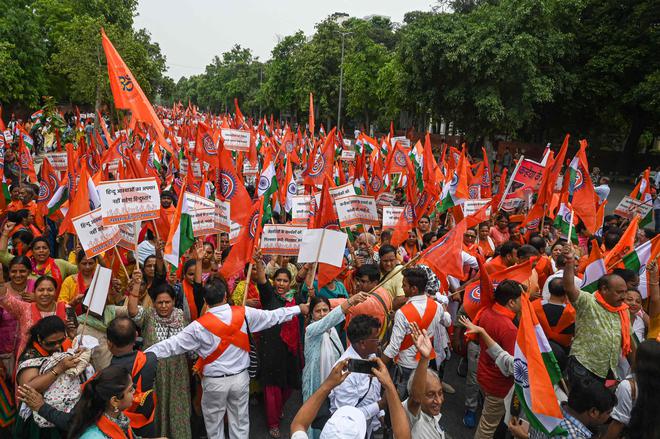The brutal murder in Udaipur of a Hindu man, allegedly for ‘blasphemy’, by two Muslims has brought the focus back on Islamist radicalism in India. There can be no doubt that blasphemy is not a capital crime in Islam. Indeed, neither the Koran nor the Prophet prescribed any earthly punishment for it although it is considered a great sin theologically.
On the contrary, the Koran encouraged the Prophet, and through him all Muslims, to “have patience with what they say, and leave them with noble (dignity)” (73:10). This is in keeping with two of the most fundamental teachings of the Koran: to “forgive and overlook, for God loves those who are kind” (5:13, 42:40-43) and, to “repel evil with goodness” so that “he between whom and you was hatred becomes your intimate friend” (41:34).
Prophet Muhammad followed these enjoinders to the letter. The Koran tells us that he was always kind to people and never “harsh-hearted” (3:159). And through the hadith literature we know that he asked Muslims to “eschew ghulu (extremism) because ghulu destroyed its practitioners in the past” (Ibn Maaja), and told them that peace can be achieved only by being lenient and presenting Islam in a manner that does not create aversion for it in the minds of people (Bukhari).

Also read: Grond Zero | A pharmacist, a tailor and the Prophet remarks row
It is no wonder, therefore, that the Koran honoured the Prophet with the title “Universal Mercy” (21:107) and described him as a humanitarian who possessed “the most exalted standard of character” (68:4).
If Muslims in some societies have not fully internalised the philanthropic aspects of Islam, it is because soon after the Prophet’s departure, influential clerics, in collaboration with Muslim power-mongers, saw to it that Koranic benignity got crushed under the combined weight of retributive legalism and religious supremacism.
The clerics suppressed the fact that the Koran does not permit Muslims to take the law into their own hands; that even the state cannot use violence except in self-defence and under extreme provocation; and that forceful state action must stop when the opposition inclines towards peace.
The cleric-state nexus led to the degradation of Prophetic Islam which is evident today in the Taliban’s brutal rule in Afghanistan and Turkey’s pan-Islamism under Recep Tayyip Erdogan, to say nothing about the violent emotionalism and maddening perversity of thought that mark the defence of the blasphemy laws in Pakistan.

Muslim radicalism in India
Interestingly, notwithstanding the impolitic Khilafat movement (1919-1924) which was an aberration, the Muslim community in India is among the few Islamic societies in the world which has remained largely unaffected by both pan-Islamic nationalism and religious extremism. To counter this reality, incidents as far apart in time as the Udaipur killing now and the murder of Mahashay Rajpal in 1929 (for writing a defamatory book against Prophet Muhammad titled Rangeela Rasul) are cited.
Just like the Udaipur killing, Rajpal’s murder was inhuman and unIslamic. But it did not set (then or later) a trend towards religious murders across India of the kind seen in Pakistan. Nor did it trigger the radicalisation of Indian Muslims although they have occasionally protested in large numbers against insults to the Prophet. Some of these protests have been violent, and hence are punishable in accordance with the law.
However, what must be unacceptable is the use of these sporadic incidents to demonise Islam and the Muslim community. One Islamophobic accusation is that the dominant narrative among Indian Muslims is of self-pitying victimhood and persecution at the hands of Hindu majoritarians. And yet, the violence that symbolises the Udaipur killers’ extremism is portrayed as emanating from the very heart of Islam.
To prove this baseless claim, “evidence” is offered from books such as Al-Hidaya (The Guidance), a 12-century text on Hanafi jurisprudence, along with another sensational claim that such books form the core component of the madrasa curriculum. The fact is, the hidaya (guidance) of the Koran is the real heart of Islam, not Al-Hidaya, which was compiled centuries after the Prophet.
Besides, the real question is not whether Al-Hidaya forms part of the madrasa curriculum in India, but how much of it has been internalised and implemented by Indian Muslims to make their religion victorious, by persuasion if possible, or by force if necessary.
That even clerics these days don’t take all pronouncements contained in books such as Al-Hidaya seriously is proved by the fact that prominent Muslim religious bodies, including the All India Muslim Personal Law Board and Jamiat Ulema-e-Hind, condemned the Udaipur killing.
One hopes the absurdity of such arguments will drive home the point that ancient religious scriptures cannot be statutorily regulated, banned or pulped just because some of them allegedly promote violence, or make uncharitable remarks about the beliefs and practices of other religions. However, such texts should be contextually interpreted and presented in a manner that helps believers make informed decisions on their modern-day relevance. Also, if, as alleged, Al-Hidaya or any other sectarian manual is being taught as the last word on the Shariah in some madrasas, this must stop because no mundane text can ever take the place of the Koran as the locus classicus of Islam.
All the same, it must be pointed out that Muslims hardly know about legal compendiums such as Al-Hidaya. Most of them may not even have heard of these books. The only scripture that they regularly recite is the Koran. For this reason, the heinous killing in Udaipur cannot be attributed to widespread radicalisation of Indian Muslims, just as clamorous calls for the annihilation of Muslims issued from Haridwar last year by some Hindutva ideologues do not indicate the radicalisation of Indian Hindus. Indian Muslims have lived long enough in a multi-religious and multi-cultural society to know better than to allow themselves to be radicalised on a large scale by anyone.
Insofar as the Udaipur killing is concerned, the BJP’s IT cell chief Amit Malviya has been reported as rejecting accusations that the alleged killers were linked to the BJP. But he said that one of them had tried to infiltrate the party (which is quite possible) just as an LTTE assassin’s attempt to enter the Congress with a plan to kill former Prime Minister Rajiv Gandhi. Media reports suggest that the killers may be affiliated to the Pakistan-based Dawat-e-Islami.
Put differently, it is yet to be ascertained if the killers were radicalised local Muslims, or instigators of mass violence who came from across the border to foment unrest in India. Such a possibility cannot be ruled out because as the Soufan Center, which is affiliated with the Soufan Group that provides strategic security intelligence services to governments and multinational organisations, said in its January 2019 report, it has always been the aim of al Qaeda to involve Indian Muslims in their “global and regional jihad” by engendering and exploiting Hindu-Muslim tensions.
In this context, a thorough investigation must be conducted to find out if the accused in the Udaipur or Amravati killings are linked to any international terror group. The Indian Muslim community too has to be vigilant enough to prevent its members from getting radicalised by forces inimical to India.
Nonetheless, as the Soufan Center noted, “Indian Muslims have mostly managed to ignore the lure of jihadi narratives, in spite of being precariously close to the geographical center of Al-Qaeda.” They have also “largely been successful in warding off Wahhabi enticements for a long time.”
Last year Hari Prasad, a researcher at the Carter Center, tried to analyse why so few Indian Muslims have joined transnational jihadist groups. Among the reason he lists are India’s non-participation in the Afghan ‘jihad’ against the Soviet Union in the 1980s, India’s Muslim leadership, a strong sense of Indian national identity and, most importantly, the influence of strong Indian Muslim families.
Message from the top
In a July 2005 interview to CNN, then Prime Minister Manmohan Singh endorsed this reality when he took pride in the fact that not one Indian Muslim out of 150 million had “joined the ranks of al Qaeda or participated in the activities of Taliban”. This, he explained, was due to the community’s firm belief in India’s secular democracy and the freedom Muslims enjoy to practice their faith without fear or favour. Nine years later, Prime Minister Narendra Modi told CNN that Indian Muslims will not dance to the tune of terror outfits such as al Qaeda because “they live for India”, “will die for India” and “will not want anything bad for India”.
Both Mr. Singh and Mr. Modi have not changed their opinions since. This means that anyone trying to demonise Indian Muslims would be sending out the pompous message that he or she is more concerned than even Indian Prime Ministers.
As Mr. Prasad points out, despite the salafi-jihadist threat to India being real, the Islamic State or al Qaeda propaganda is not driving Muslim politics in India. Indian Muslims, he says, are forging their own religious and political paths, within the framework of the Indian Constitution, and it is imperative for everyone to recognise this.
In his perceptive message to Muslims on Eid ul-Azha, Mr. Modi hoped that the festival would inspire all “to work towards furthering the spirit of collective well-being and prosperity for the good of humankind”.
This is possible only if Indians start working for the collective well-being of the country first by promoting Hindu-Muslim unity. Florid-hued rants in the public sphere against any one faith or community will frustrate our Prime Minister’s good intentions and thwart India’s progress in the long run.
( A. Faizur Rahman is Secretary-General of the Islamic Forum for the Promotion of Moderate Thought)
themoderates2020@gmail.com







